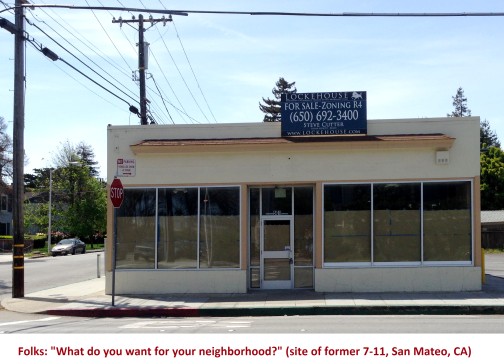
“The Permaculture Convenience Store” – Vision Plan by Willi Paul, Planetshifter.com Magazine
Most are familiar with the neighborhood convenience store. Candy, cigarettes, caffeinated power drinks, chips, etc. Isn’t it ironic that these sellers of junk food and smokes are “filed under convenience?”
Convenience goods are widely distributed products that "require minimal time and physical and mental effort to purchase." Convenient procedures, products and services are those intended to increase ease in accessibility, save resources and decrease frustration.
But what would most folks say is a healthy alternative to consumer convenience? My vote is efficiency:
Efficiency … describes the extent to which time, effort or cost is well used for the intended task or purpose. It is often used with the specific purpose … to produce a specific outcome effectively with a minimum amount or quantity of waste, expense, or unnecessary effort.
Here’s the pitch: We need to start “ thinking in Transition” defined as foregoing convenience for programs and design that incorporate healthy neighborhood services that support healthy food and sustainable land use.
Some support: from Permaculture Principle 6: Make the least change for the greatest effect. Find the “leverage points” in the system and intervene there, where the least work accomplishes the most change.
Consider a 7-11 Store? Is this a valuable neighborhood service provider or something else? A 7-11 store was just closed by that corporation with the approval of the neighborhood in San Mateo.
Cold beer coolers aside, we need more urban permaculture / Transition-based Food Coops or start-up incubators or training accelerators.
The Permaculture Convenience Store -
Components:
Seed Exchange
Demonstration Plot & Plant Nursery
Local and Regional Organizations Directory
Permaculture Design Consultants Directory
In-house Education - Classroom Space
Free Book Exchange - Spirit, Technical and Nature Titles
Neighborhood Fair Wage Jobs Program
Design Plans - Tool Sheds, Compost Bins, Rocket Stoves, Gardens, etc.
Tools & Supplies:
+ Sickles
+ Machetes
+ Knives
+ Shovels
+ Weeding Hoes
+ A-frames (contour ID)
+ Twine
+ Boards for Raised Beds
+ Cutter / Snips
+ Swiss Army style grafting knife
+ Spades
+ Chicken Wire
+ Forks
+ Water Buckets
+ Greywater tanks & hardware
+ Compost starter & bins
+ Hay bales
+ Orange flagging
+ Recycled Lumber
Conclusions –
The Permaculture Convenience Store is a transformed “Old Fashioned” neighborhood hardware store with a Transition spirit twist. The rich interaction between new principles, garden tools and neighbors will foster a new global mythology !
Replies
Thinking in transition sounds to me like anticipation as used by Robert Rosen. Rosen isn’t (wasn’t) as influential as a scientist as he should be. He called anticipation everything that makes living beings (some of them self-aware) different from machines. Long story short, anticipation understood this way sounds to me very, very similar to Carl Jung’s ideas (including the mind-matter part) about active imagination and individuation and Joseph Campbell’s Hero Journey. They are like different names for a “hero’s” attempts to align his/her life story to the future and the surroundings.
The success of such a journey depends, no matter how a hero might be brave and tough, depends on the context. Emergence isn’t about something appearing out of nothing, but about constraints. Without constraints you would be a random pile of dust. With wrong constraints you would have a leg where there should be an arm. Some “pictorial” constraints are called archetypes and myths.
"Emergence isn’t about something appearing out of nothing, but about constraints." Very interesting.
I can go with your "Some “pictorial” constraints are called archetypes and myths" but would add that sound alchemy and sound myths are also in the mix. I am working with a new set of so-called constraints in the new mythology: